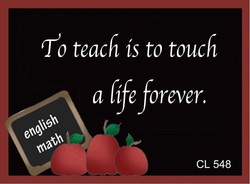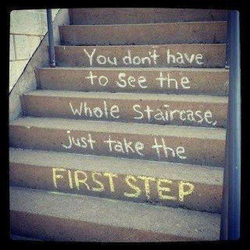
What if? How can I? We can respond to new ideas or challenges with doubt or a resounding "NO!" Or we could consider the possibilities. Isn't it interesting how life provides us with all kinds of opportunities and our reactions to those make all the difference?
I started this blog last night, thinking of the recent opportunities presented to me that were exciting, but also caused me to be somewhat anxious. I acted on the opportunity because I didn't want any regrets. I have no illusions that there are any guarantees, but just resolving to try made me feel at ease. Then this morning, I read a post by my favorite blogger, Dan Rockwell (Leadership Freak: Choose Your Default Response), and his words spoke to me again about the responses we choose and how those impact not only ourselves, but those around us too.
It happens all of the time... we must respond in some way to every situation. What will I do today as I roll out of bed? Did I smile? Did I take time to acknowledge, or just rush on by? Will I go or will I stay? Should I or shouldn't I? Can I do this? or How can I do this?
When presented with something new, are you that person who says "No" first and then reconsiders (or wishes you had)? What if you simply considered the possibilities? What if your first thought is how can I make this work, or use this new idea? What if you put yourself "in" the view instead of just wishing your were there? New challenges us. It is exciting, but it means change and that often scares us into doubt or retreat. What if we didn't let doubt be our first thought?
There are also the reactions to obstacles or mistakes. Stress makes us do some crazy things sometimes. How do you react when something goes awry? Do you freak out or get busy finding a solution? When I taught Psychology we talked about the "fight or flight" response. Do you own it and try to work through it or correct the issue? Or do you run.... sometimes literally... the other way? My grandson is a perfect example of this. When he spills his glass of juice or knocks something off the counter, instead of trying to right the "wrong" - he literally runs out of the room. I'm not sure if he doesn't know what to do (despite our efforts to teach him), he's afraid of the consequences (which are not as bad as he's imagining), or he's just disappointed in himself. No matter, his response is to flee and then come back to "fight" after some encouragement from us. On the other hand, his younger brother's typical response is to fix it... so he responds by picking up the spilled glass and saying he's sorry for knocking the papers off the counter. Totally different reactions to similar situations... can we learn to respond differently? Do some of these same responses show up when we consider a new challenge or idea?
Sometimes, as noted in Dan's blog, we just freeze. Paralysis from analysis? Perhaps, but as my dad used to say, "Not to decide is to decide." Even our inaction is an action. When we "freeze" we take the consequences instead of having some control over them. If you "freeze" when a car suddenly veers in your lane, you risk being hit head on unless you take corrective action. Even if the decision is not life altering, when you can't (or don't) decide then that indecision impacts others around you who are waiting on your decision. Have you ever worked for a boss who took too long to make decisions? Everything comes to a standstill until the decision is rendered. Indecision is selfish in some ways too because it forces others to make the decision or deal with the fallout of the indecision. Indecision can also impact you because you may miss an opportunity or a good deal.
Whatever the situation, we develop default responses. And while your personality may make you cautious or risky, you can learn (or unlearn) responses that will help you make good choices that will enhance your knowledge and/or experiences.
Working with others means there are ideas out there you might not have previously considered. As a teacher, I generally have something in mind for an answer when I pose a question. Sometimes students don't respond the way I intended. Does that make their response incorrect? Sometimes, but many times it means they simply thought about my question in a different way. Their background knowledge shaped their perspective just as mine did. So I have to carefully consider the response they provided and the response I will give them too. When new ideas are presented, consider making your initial response, "How might this work" instead of "this won't work."
I believe that living your life with possibilities instead of doubt will make all the difference. If you can do that, those scenic views or adventures will now be something you've experienced not just simply dreamed of. As George Bernard Shaw once said, "Some men see things and ask 'why?' I dream of things that never were and ask, "why not?"
So this week, I have not just dreamed a new dream, but I have acted on that dream. Will I get what I seek - who knows? But I brushed aside the doubt and silenced the many reasons it might not happen that creep into my thoughts. I have taken that first step forward. Perhaps it is a leap of faith, but without that first step, how would I ever know what could be? My default response now makes me more open to possibilities.... and you just never know where that will lead.



 RSS Feed
RSS Feed